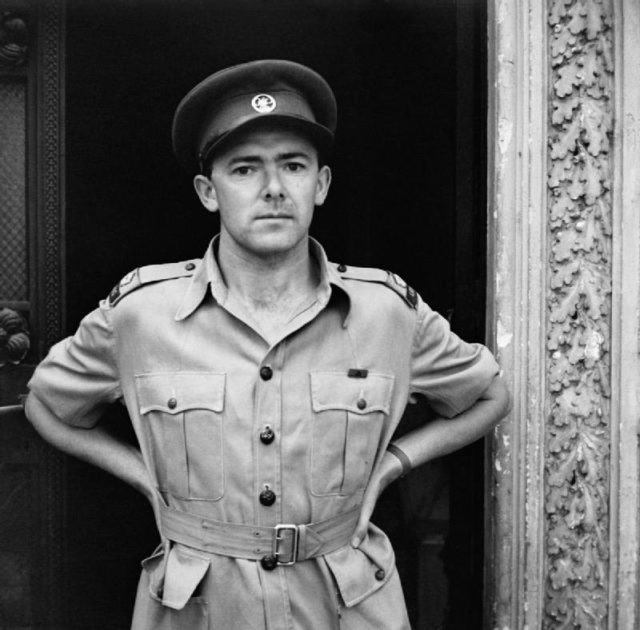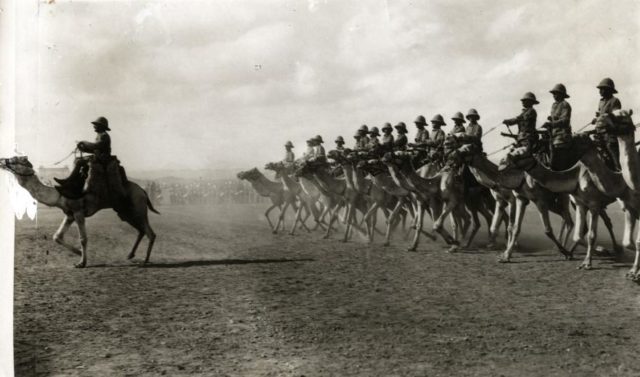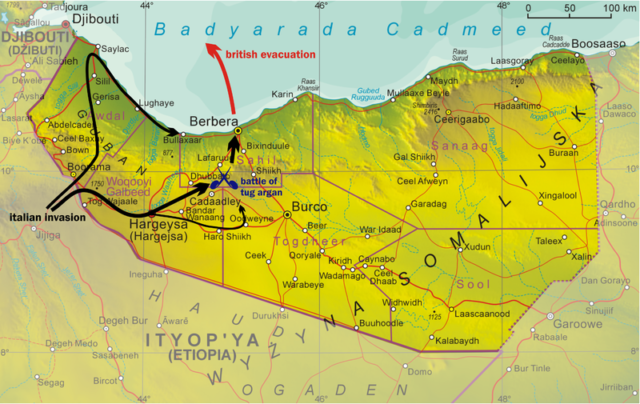As a result of the inexplicable gallantry it takes to receive one, it is entirely common for such an award to be given posthumously to its recipient. It is, however, entirely uncommon for a Victoria Cross to be awarded posthumously to a man still very much alive. Such is the case for Lieutenant-Colonel Eric Wilson who was last seen making a gallant last stand on a hill in Somaliland and presumed dead when it was all over.
News of this heroic stand raced back to England and in October of 1940, Wilson received his national acclaim as the country mourned his loss. The only problem was that Wilson was still very much alive, and languishing in an Italian POW camp oblivious to the honor granted him. Released in 1941, he returned to England to receive his honor, but in keeping with his proven strength of spirit insisted on returning to the fight. Declared dead and now alive again, Lt. Col Eric Wilson would take this newfound lease on life back to the enemy with a passion.

News of this heroic stand raced back to England and in October of 1940 Wilson received his national acclaim as the country mourned his loss. The only problem was that Wilson was still very much alive, and languishing in an Italian POW camp oblivious to the honor granted him. Released in 1941, he returned to England to receive his honor, but in keeping with his proven strength of spirit insisted on returning to the fight. Declared dead and now alive again, Lt. Col Eric Wilson would take this newfound lease on life back to the enemy with a passion.
A Home Away from Home
Born in Sandown on the Isle of Wight off the coast of England, Eric Wilson was a World War 2 Victoria Cross recipient who would see a second birth of sorts some 30 years later. Commissioned a second lieutenant in 1933, he would eventually make his way to serve in The King’s African Rifles in 1937 before joining the Somaliland Camel Corps in 1939. For better or worse, Africa would be a home away from home for Wilson, and it was here that he would spill so much of his own blood.

As war began to break out across Europe, the Italians had visions of kicking the British off the continent of Africa. For Wilson, this would place his Somaliland Camel Corps and the whole of British Somaliland square in the line of fire. In August of 1940, Italian forces commanded by General Guglielmo Nasi poured into the territory in overwhelming numbers.
As the Italians continued to advance into Somaliland, the outnumbered British found themselves in a state of continued withdrawal. From August 3rd until August 10th the Italians met stiff resistance but continued to advance with seeming ease. And, for Wilson, this would mean his inevitable death, and then rebirth.
Defend the Hill
By August 10th, the British-led forces had settled into strong defensive positions on six hills around Tug Argan. It was here that Wilson was called into the height of his action and for five days would defend his hill bloody, battered, and presumably until his death. Armed with Vickers machine guns, Wilson, and his team began the defense as the Italians assaulted on August 11th.
With withering fire, Wilson suppressed the enemy attack on not only his own hill but an adjacent position within range. His fire was so effective that the Italians were forced to pause the assault until artillery could be brought to bear.

Determined to eliminate Wilson’s gun crews, artillery rained down on his position blowing several guns off their stands and wounding Wilson in the should and eye. However, with great resolve Wilson rallied the team, replaced the guns, and resumed the fight. On the 12th and 14th, the enemy continued to press Wilson’s position to no avail as one by one more of his Somali fighters were killed beside him. By the evening of the 14th, Wilson was suffering from his untreated wounds, now battling symptoms of malaria, but still very much in the fight.
However, as the British position became more untenable, the situation became dire on every hill. By 5 p.m on the 15th, Wilson’s hill was finally taken after five days of fighting as Captain Wilson, “fighting to the last, was killed” as read in his Victoria Cross citation. News of this heroic last stand began to sweep the nation and by October of 1940 he had been awarded his nation’s highest military honor.
The Story Continues
Remarkably, that very same month it was reported that although wounded heavily and on the verge of death, Eric Wilson had survived. This was confirmed by another captured British officer who upon his own arrival to a POW camp in Eritrea was shocked to find the nation’s latest military hero alive. In 1941, the Italian forces left East Africa, and Eric Wilson was released from captivity. In July of 1942, he received his Victoria Cross at Buckingham Palace looking very good for a man once thought dead.
In 1941, he would go on to serve as a Major with the famed Long Range Desert Group and then continued to lead Commonwealth forces in both Africa and the Burma campaigns. After another bout with illness contracted in the Burma campaign, he returned Africa where he would spend the rest of the war in a training command.Wilson left the Army in 1949 but continued to remain abroad in the foreign service in Africa. Perhaps it was simply hard for the man who spilled so much blooded defending the place to leave it behind for good. He did return to London in 1966 where he continued to prove death would not come easy to him. When he finally died in 2008 at the age of 96, he was the last surviving British Army VC recipient of the Second World War proving once again, Lt. Colonel Eric Wilson knew how to make a heroic final last stand.
Wilson left the Army in 1949 but continued to remain abroad in the foreign service in Africa. Perhaps it was simply hard for the man who spilled so much blooded defending the place to leave it behind for good. He did return to London in 1966 where he continued to prove death would not come easy to him. When he finally died in 2008 at the age of 96, he was the last surviving British Army VC recipient of the Second World War proving once again, Lt. Colonel Eric Wilson knew how to make a heroic final last stand.
